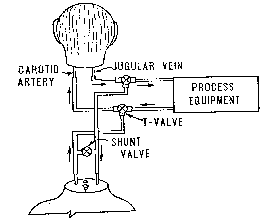This is a a large, professional-looking volume, running to 461 pages including a detailed index, all on the esoteric subject of keeping severed heads alive. Its author, “Chet Fleming”, an engineer and patent lawyer takes some pains to appear rational and considered, but the effect of his book is more of a well-turned-out mature gentleman who buttonholes one at a party and drones on about his preculiar obsession - or, like an updated version of the character Mr Dick, from David Copperfield, who cannot keep off the subject of King Charles's head.
Recognising perhaps that producing a book on such an offbeat subject might be damaging to his career, he chooses to hide behind a pseudonym, or “polinym” - as he prefers. The distinction is evidently of some importance to him, and he spends several pages on an explanation, linking it to a crankish proposal whereby minor public servants would be able to hide their real names so as to preserve more of their private lives. (He does not address the question of whether, when their duties required them to appear in public, they would be permitted to wear masks.)
This sort of digressiveness, the tendency to jump from one hobby-horse to another, is characteristic. He is clearly a man with not merely a solitary bee in his bonnet. Thus, while he has our attention, he is keen to introduce other vital matters to the discussion, such as the matter of acid rain; the promotion of a simplified form of English as an international language; and, not to be forgotten, his idea to reduce energy wastage by getting people to exercise on bicycles with generators attached, so they can return some electricity to the system.
These interesting byways aside, most of the book is, as billed, about severed heads, his principal concern being is that the technology for keeping them alive might be developed without proper ethical control. To that end, he submitted a (successful, ultimately) US patent application (#4,666,425), intended to ensure that no one can work on such a process without his say-so, rather than to protect work that he has actually carried out himself. The complete text of his patent together with legal and technical commentaries are included, for the benefit of the more energetic reader.
The need to be exhaustively thorough is another of Fleming's compulsions: he cannot, for example, resist commenting on the science fiction view of keeping severed heads alive, particularly that presented in the novel Heads, by David Osborn (1985), whose lack of technical scrupulousness greatly irks him. His response is the writing of a novel, as yet to see the light of day, which will redress the inaccuracies of its literary predecessors by a realistic depiction of the technology involved. One can only speculate as to whether it will be as thrilling as this, its non-fictional counterpart.
A small element of drama is introduced, if you have a recently produced copy of this book. Included with it you will find a sheet of paper updating you with recent developments in the severed head field, including the status of the patent. Mine is dated March 1999, and reports the sad news that the patent was refused. However, I am happy to report that - at the time of writing this review - the refusal has been reversed and the patent now stands. So the nagging worry that people might be developing severed head technology without Fleming's ethical oversight is allayed, for now. Although the patent only applies within the US, so no doubt the Axis of Evil is busy at work on its own program for the reanimation of disconnected noggins.
The idea of foreign dictators getting their hands (or should that be heads?) on this technology also troubles Fleming. Never mind nuclear programs, somehow the idea of a latter-day Stalin living on as a head in a fishtank is more worrying, even though expired dictators are soon enough replaced by their sons, prime ministers or former enemies. And the fact that ordinary transplant surgery or advances in drug treatments can equally well - and will, more probably - be used to preserve the lives of evil rulers, seems to pass him by.
What Fleming clearly lacks is a sense of proportion, though unlike most crank writers he is both erudite and undogmatic. As you might expect from one qualified in the law, much of this volume is very dry indeed, and certainly it is not something to be read from cover to cover. But then, with such an irresistible title to adorn one's special shelf, who cares?

This site is wonderful. And
Today an article can be found
I mean er it is a good
Thanks Guy, I have left a
Thanks Guy, I have left a comment on that article to refute the idea that the patent was registered by a bunch of mad scientists, rather than one slightly nutty monomaniac.
Apparently he was not very